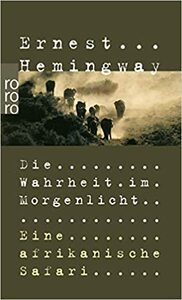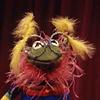Take a photo of a barcode or cover
Definitely not my favorite Hemingway. Some clever lines, but disappointing overall plot.
Brian Dennehy did the narration. On the one hand, he didn't do much to differentiate from one character to the next, which was sometimes confusing. And I guess he can't do a British accent either . . . what is up with actors not being able to do a British accent? That should be a requirement for qualifying for a SAG card. Anyway. But his voice is soothing and I enjoyed his narration. At least partly because, in my mind's eye, he looks a little like Hemingway.
So, I liked this book. Nothing happens in it, really, but I don't care. It's slow and relaxing and makes me want to be on a safari in Africa.
I can't speak to how much it really "sounds" like Hemingway -- this is a posthumous book, and some people think it was edited terribly. The sentences are staccato and repetitive, but isn't that just how he writes? I must read more Hemingway to compare.
Also I don't know why people call him a jerk in relation to this book, I don't think he's a jerk at all! Well, except when he makes Miss Mary sound like a ten-year-old. But besides that, he's an all right dude.
EDIT, 1/3/09: I'm bumping this baby up to 5 stars because I think about it all the time, always think that people I know should read it, and have thought about getting it out from the library to listen to it again. Not sure what it is I like so much about this book, but I do.
So, I liked this book. Nothing happens in it, really, but I don't care. It's slow and relaxing and makes me want to be on a safari in Africa.
I can't speak to how much it really "sounds" like Hemingway -- this is a posthumous book, and some people think it was edited terribly. The sentences are staccato and repetitive, but isn't that just how he writes? I must read more Hemingway to compare.
Also I don't know why people call him a jerk in relation to this book, I don't think he's a jerk at all! Well, except when he makes Miss Mary sound like a ten-year-old. But besides that, he's an all right dude.
EDIT, 1/3/09: I'm bumping this baby up to 5 stars because I think about it all the time, always think that people I know should read it, and have thought about getting it out from the library to listen to it again. Not sure what it is I like so much about this book, but I do.
Libro postumo del grande Ernest, a cavallo tra un'autobiografia, un diario e un romanzo. Una quieta, e allo stesso abbagliante, descrizione della vita in un tipico campo di safari.
Un libro minimo, se si vuole, in quanto ad avvenimenti, che tuttavia respira del respiro di uno scrittore eccelso, di un uomo curioso, intelligente, empatico e disincantato.
Un libro minimo, se si vuole, in quanto ad avvenimenti, che tuttavia respira del respiro di uno scrittore eccelso, di un uomo curioso, intelligente, empatico e disincantato.
Two works bracketing Hemingway’s life were both published after his death: A Moveable Feast, which chronicles his youthful days in Paris at that time of creative fervor, and this ‘fictional memoir’ culled by his son Patrick from a massive draft that the author gave up on after the two plane crashes that cut into his vigor and may well have been the beginning of the end for Hemingway. The story tells of the Hemingway’s last safari in Africa on the eve of Kenyan independence. First there is the star power of this remarkable couple living the adventure, Mary intent upon bagging a large rogue lion before Christmas, and her selection of a ‘Christmas tree’ with hallucinogenic properties; Papa playing the last of the great white hunters, acting as high priest and shaman to his crew, enjoying the beguiling insolence of his Kamba mistress, and steering through some rough passages during the Mau Mau uprising. Even Hepburn and Tracy would have a hard time pulling this off. There is a great understated melancholy underneath it all, a tragic sense of what might be mid-life for most, but was too near the end for Hemingway. It is a time of waning light, of seasoned pleasures, when what is true of the hunt, of the prey, of the hunter, and of love – that they all must end – seems inescapable. ‘No hay remedio,’ as Papa says in one of a handful of polyglot saws that make the rounds – ‘Nothing to be done.’ It may owe to the author’s never got a second pass at these words, but I think the writing here may be a nice surprise for readers who find Hemingway’s style mannered or stilted; there is a great grace and simplicity here. Mary bags here lion, and Hemingway bags one last lingering story of the autumn of his years.
My first book finished in 2018. I listened to the very nicely done audio version by the great Brian Dennehy. Still and all, I would likely benefit from picking up a paper copy because I couldn't grasp everything as it passed. There are some parts that were definitely not up my alley, as I find hunting difficult to deal with when not in the abstract. And any relationship between Hem and a woman is at best challenging to explore since nothing ever ended well. And to be honest, until I looked the book up a few minutes ago on that wiki thing, I did not get that it took place during the time of an actual rebellion. On a potential re-read, I will appreciate that context, since the descriptions of the various African tribes and their relationships were harder to follow on audio. And the tenets of his religion, but I have to admit, that struck me as pure Hemingway.
His last fictional work as edited by his son Patrick is almost a memoir or his safari days in AFrica. The plot is satirical and poignant. Enjoyable.
adventurous
reflective
relaxing
slow-paced
Plot or Character Driven:
Character
Strong character development:
Complicated
Loveable characters:
Complicated
Diverse cast of characters:
Yes
Flaws of characters a main focus:
Complicated
I read Green Hills of Africa last summer, and enjoying that immensely, was excited to discover Hemingway had written another novel about his travels in Africa. Although I'm vehemently against big game hunting myself, I love the reverence in Hemingway's description of wildlife and landscapes. It makes me feel nostalgic for a place I've never visited, which is no mean feat. True at First Light didn't disappoint in that respect; however, it felt much more political than Green Hills of Africa. Hemingway draws a lot of attention to his own highly flawed and problematic nature, and although I appreciate the author's honesty and self-awareness throughout the novel, it can at times be uncomfortable to be reminded of the kind of person the author was. If you can get past that, though, this was a truly transportative and clearly heartfelt ode to Africa.
I genuinely didn’t enjoy this book atall. I bought it from Shakespeare and company when I was twelve years old as a token gift for myself - and that is all I consider it to be.
I finally got round to picking it up last year - and let me say, It felt like the longest book I have ever read despite its nature being quite petite. I never thought to myself :
Hey
Can’t wait to read more!
Or
I can’t put it down!
In the grand scheme of things - I desperately wanted to finish it so I could put it down!
I struggled to feel enticed to turn the pages, I felt as though I couldn’t see any plot, any interesting characters or development at that.
Maybe I’m just too stupid to understand the art of it - or maybe Hemingway was just having an off day with this one.
Kudos to the gorgeous descriptions throughout though, that was a pretty read.
I finally got round to picking it up last year - and let me say, It felt like the longest book I have ever read despite its nature being quite petite. I never thought to myself :
Hey
Can’t wait to read more!
Or
I can’t put it down!
In the grand scheme of things - I desperately wanted to finish it so I could put it down!
I struggled to feel enticed to turn the pages, I felt as though I couldn’t see any plot, any interesting characters or development at that.
Maybe I’m just too stupid to understand the art of it - or maybe Hemingway was just having an off day with this one.
Kudos to the gorgeous descriptions throughout though, that was a pretty read.
adventurous
adventurous
informative
mysterious
slow-paced
Plot or Character Driven:
N/A
Strong character development:
No
Loveable characters:
Yes
Diverse cast of characters:
No
Flaws of characters a main focus:
No
“I’d rather live in a place and have an actual part in the life of it than just see new strange things.”
This book was reworked by Ernest Hemingway’s son Patrick and published after his death in the mid-1990’s.
The book title is inspired by Mary Hemingway’s fourth wife’s poem mentioning; “In Africa a thing is true at first light and a lie by noon and you have no more respect for it than for the lovely, perfect weed-fringed lake you see across the sun-baked salt plain. You have walked across that plain in the morning and you know that no such lake is there.”
The book is mix between a memoir and fiction about Ernest and Mary Hemingway’s trip to Africa, about their relationship how he loved his wife and how they disagreed together, also about how keen he was to help Mary hunt the majestic lion she wanted to hunt down by herself.
When you read this book you will feel like reading someone’s journal which is very personal and exciting at times, however would be rather boring at other times as it lacks the art of good storytelling.
This book was reworked by Ernest Hemingway’s son Patrick and published after his death in the mid-1990’s.
The book title is inspired by Mary Hemingway’s fourth wife’s poem mentioning; “In Africa a thing is true at first light and a lie by noon and you have no more respect for it than for the lovely, perfect weed-fringed lake you see across the sun-baked salt plain. You have walked across that plain in the morning and you know that no such lake is there.”
The book is mix between a memoir and fiction about Ernest and Mary Hemingway’s trip to Africa, about their relationship how he loved his wife and how they disagreed together, also about how keen he was to help Mary hunt the majestic lion she wanted to hunt down by herself.
When you read this book you will feel like reading someone’s journal which is very personal and exciting at times, however would be rather boring at other times as it lacks the art of good storytelling.







